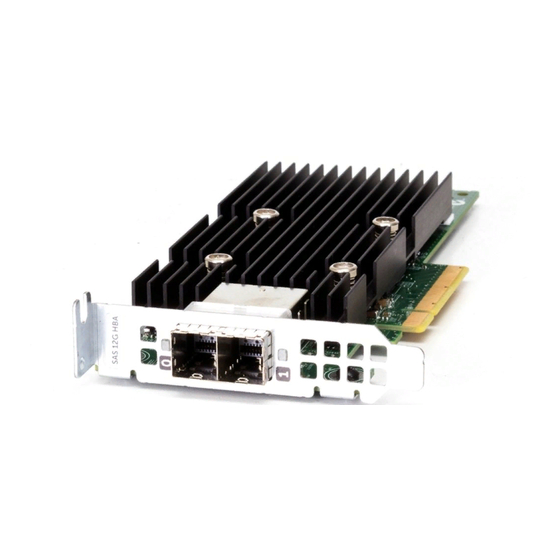Dell PowerEdge Kurzanleitung - Seite 4
Blättern Sie online oder laden Sie pdf Kurzanleitung für Lagerung Dell PowerEdge herunter. Dell PowerEdge 6 Seiten. Vmware esxi software on servers
Auch für Dell PowerEdge: Portfolio-Handbuch (27 seiten), Handbuch verwenden (44 seiten), Benutzerhandbuch (20 seiten), Handbuch zur Systemverwaltung (28 seiten)

"
PERC 6 controllers are designed to provide
enhanced performance, simplified man-
agement, increased reliability and fault
tolerance, optimized deployment with
Dell PowerVault storage, and flexible RAID
configuration and management tools."
allocations based on the characteristics of
the storage environment. This auto-tuning
feature helps administrators avoid the time-
consuming effort of manually tuning the
controller cache in a test environment.
Administrators can also perform real-
time RAID-level migration by converting
one RAID level to a different RAID level.
Figure 3 lists possible RAID-level migra-
tions and the number of drives required
at the beginning and end of the process.
RAID-level migration and expansion
cannot be performed on RAID-10,
RAID-50, or RAID-60 configurations.
IncreaSed relIabIlIty and
fault tolerance
Beyond industry-standard RAID levels,
PERC 6 controllers offer myriad features
to help protect data, including advanced
media error protection, enhanced rebuild
capabilities, consistency check and
background initialization, and other
key features such as Self-Monitoring,
Analysis, and Reporting Technology
(SMART), failed physical disk detection,
and hot spares.
advanced media error protection
PERC 6 controllers provide advanced
media error monitoring and repair tech-
nologies designed to prevent data loss
and enable safe data retrieval. For exam-
ple, a typical response to a media error in
a RAID controller would be to read the
data from the redundant disk and con-
tinue on. However, when a PERC 6
encounters media errors during normal
read and write operations, it can immedi-
ately attempt to repair the data. This
Reprinted from Dell Power Solutions, May 2008. Copyright © 2008 Dell Inc. All rights reserved.
on-the-fly media error repair capability
helps increase data reliability by fixing data
written to bad media sectors, thus helping
reduce the potential for data loss.
Preemptive media error monitoring
through disk scanning services is typically
essential for enterprise-class RAID con-
trollers. While a typical approach to this
monitoring would employ a background
consistency check to scan for media
errors, the Patrol Read feature of PERC 6
controllers implements verify commands
to help validate media—a method that can
help significantly increase efficiency, par-
ticularly when encountering multiple
media errors on drives in an array.
enhanced rebuild capabilities
When an array is in degraded mode fol-
lowing a disk failure, the risk for potential
data loss increases—particularly if the
Source raId level
target raId level
RAID-0
RAID-1
RAID-0
RAID-5
RAID-0
RAID-6
RAID-1
RAID-0
RAID-1
RAID-5
RAID-1
RAID-6
RAID-5
RAID-0
RAID-5
RAID-6
RAID-6
RAID-0
RAID-6
RAID-5
Figure 3.
Possible RAID migrations supported with Dell PERC 6 controllers
controller encounters media errors on
optimal disks in the array during a rebuild.
In contrast to controllers that might imme-
diately stop the rebuild, the PERC 6 con-
tinues the rebuild to the end, allowing
administrators to access all valid data on
the virtual disk even though data has been
lost on the virtual disk stripe where the
media error occurred.
consistency check and background
initialization
The consistency check operation helps
verify the correctness of data in logical
drives that use RAID levels 1, 5, 6, 10, 50,
and 60 (RAID level 0 does not provide
data redundancy). For example, in a
system with parity, checking consistency
means computing the data on one drive
and comparing the results to the contents
of the parity drive. Dell recommends that
administrators perform a consistency
check at least once a month to help main-
tain optimum array status.
Background initialization is a consis-
tency check that is forced when creating
a logical drive, and automatically begins
five minutes after the drive has been
created. This operation checks for media
errors on physical disks and helps ensure
that striped data segments are the
same on all physical drives in an array.
required number of
required number of
source physical disks
target physical disks
1
1
1
2
2
2
3
3
4
4
DELL.COM/PowerSolutions
2
3
4
1
3
4
3
4
4
3
91
